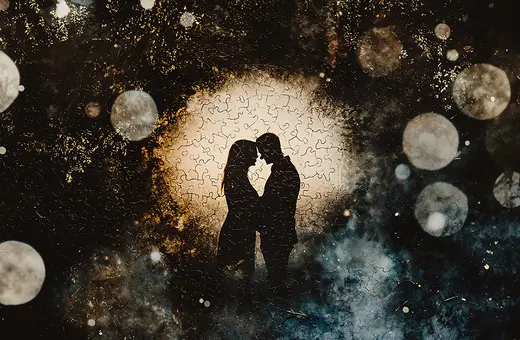As much as our culture idolizes beauty, it also thinks it’s shallow and superficial. But both of these evaluations get something wrong. The idea of beauty as only skin-deep is based on a long-debunked division between body and soul. Yet the fleeting admiration of a stranger’s beauty also misses the point. True appreciation of beauty takes attention, care, and love, argues David Egan.
Beauty is only skin deep, we’re told. It’s superficial to be too concerned about surfaces and deep to love the depths of a person’s character. Stories like Beauty and the Beast and The Wife of Bath’s Tale emphasize the importance of seeing past a person’s outward appearance to their inner beauty.
And yet. People are drawn to physically attractive people, and not only when it comes to mate choice. With voter preference, jury verdicts, students’ evaluation of teachers, teachers’ evaluation of students, looks, apparently, count. Good-looking people tend to be judged more intelligent and honest. Even tales of loathly ladies and princely beasts make the significant concession of rewarding the pure-hearted lover who sees their hideous beloved’s inner beauty with a magical transformation at the end. The reward for being able to see past someone’s outward appearance is, curiously, a really good-looking partner.
Is all this just hormonal prejudice, which moralists and fairy tales try to correct in vain? I don’t think so. Beauty is important—too important for us to outsource its appreciation to ad agencies and Instagram influencers.
Even those intangible qualities of character—the kindness, compassion, and integrity that make pure-hearted lovers swoon—are significantly conditioned by genetics and upbringing.
What’s wrong with assessing a person based on their looks? Determining jury verdicts or student evaluations on that basis is a straightforward rational error: the characteristics you’re supposed to be assessing don’t correlate with physical appearance. But it’s not so obvious when it comes to love that looks don’t matter. Physical appearance might be the wrong criterion for assessing criminal culpability but surely it’s not a bad one for sparking physical desire.
The obvious answer, to cite another cliché, is that looks aren’t everything. To the extent that we’re talking about love and not just lust, we’re talking about an affection that extends to the whole person and not just to their physical attributes. But this response only gets us so far. Presumably a person’s appearance is a part of the ‘whole person.’ It might not be everything but surely it’s something.
Another concern might be for fairness. We don’t get to choose the way we look so it’s unfair that some people benefit and others lose out on account of a genetic lottery. But intelligence is also largely a matter of luck and no one scolds sapiosexuals for favouring unearned advantages. Even those intangible qualities of character—the kindness, compassion, and integrity that make pure-hearted lovers swoon—are significantly conditioned by genetics and upbringing. These are all qualities a person can cultivate, but physical beauty, too, can be enhanced or marred by lifestyle choices. Yet if you work to cultivate compassion you’re admired and if you obsessively sculpt your physique you’re vain.
Contrarianism aside, I think there’s something right about the conventional wisdom. I’d be happier and better off if conventional standards of attractiveness had less of a hold on me. But I think the metaphors of inner and outer, surface and depth, misdiagnose the nature of the tension. As a result, they come off as puritanical and uncompelling.





















Join the conversation